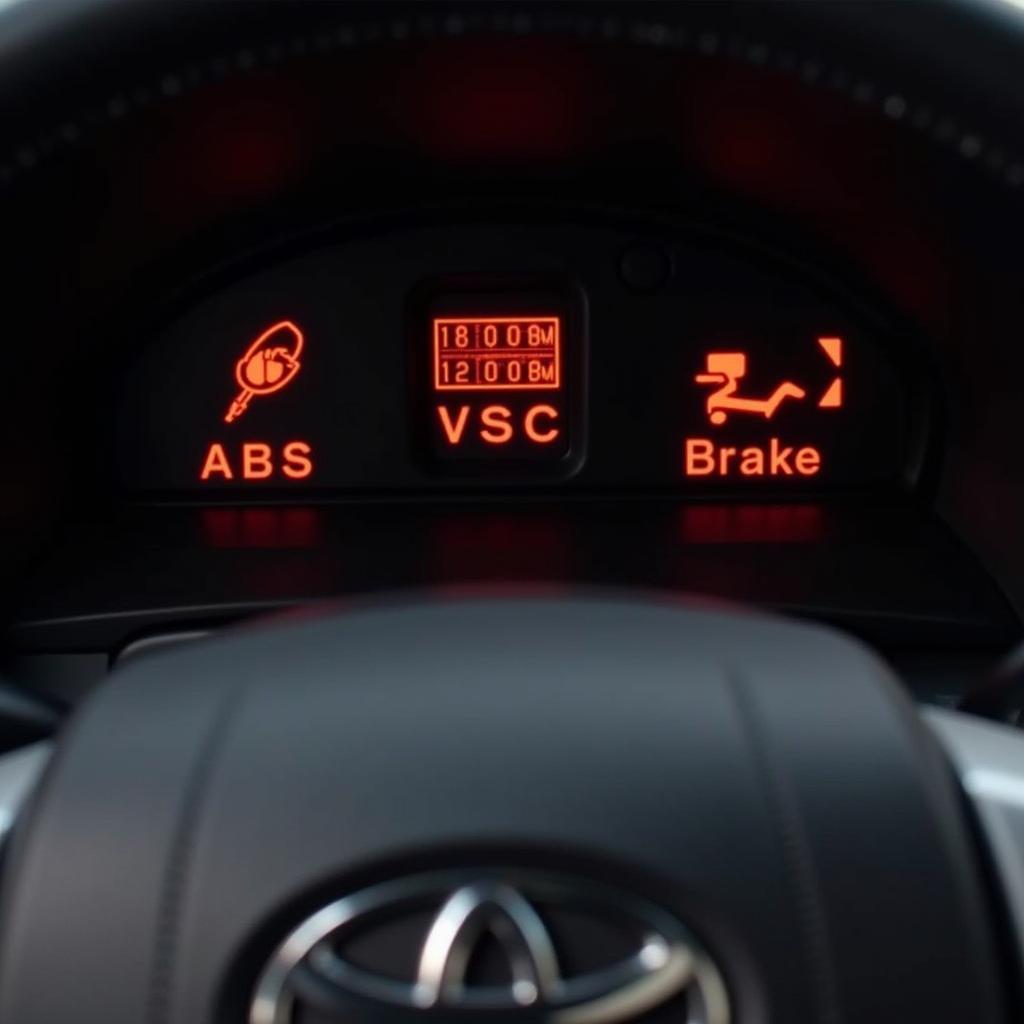If you’re a 2008 Toyota Prius owner, seeing your ABS, VSC, and brake warning lights illuminated simultaneously can be a real head-scratcher. Don’t panic, this is a relatively common issue in these models, and it doesn’t necessarily mean a major breakdown. This article will guide you through the possible causes and solutions for this trio of warning lights.
Understanding the Warning Lights
Before diving into troubleshooting, let’s understand what these lights indicate:
- ABS (Anti-lock Braking System): The ABS light indicates a potential issue with your anti-lock braking system, which prevents wheel lockup during hard braking.
- VSC (Vehicle Stability Control): The VSC light signals a problem with the system that helps maintain traction and stability, especially on slippery surfaces.
- Brake Warning Light: This light typically signals a problem with your traditional braking system, low brake fluid, or a faulty brake light switch.
When all three lights illuminate simultaneously in a 2008 Prius, it often points to a problem within the brake system that’s impacting the ABS and VSC systems.
 2008 Prius Dashboard Warning Lights
2008 Prius Dashboard Warning Lights
Common Causes and Troubleshooting
Here are some common culprits behind the “2008 Prius ABS VSC and brake warning light on” issue:
1. Faulty Brake Actuator Assembly
The brake actuator assembly is a common culprit in 2008 Prius models. This component is responsible for distributing brake fluid pressure to the wheels and can malfunction, triggering the warning lights.
Solution: A qualified mechanic needs to inspect and potentially replace the brake actuator assembly. This is a complex repair best left to professionals.
2. Low Brake Fluid
Low brake fluid levels can trigger various warning lights, including those for ABS, VSC, and the general brake system.
Solution: Check your brake fluid level. If it’s low, carefully top it off with the recommended brake fluid type. If you notice a frequent need to add brake fluid, there might be a leak that requires professional attention.
3. Brake Light Switch Malfunction
Believe it or not, a faulty brake light switch can trigger the ABS, VSC, and brake warning lights. This switch signals your brake lights to illuminate when you press the brake pedal. If it malfunctions, it can disrupt communication within the brake system, leading to the warning lights.
Solution: Have a mechanic inspect your brake light switch. Replacing it is typically a straightforward and affordable repair.
4. Wheel Speed Sensor Issue
Wheel speed sensors play a vital role in both ABS and VSC systems. If a sensor malfunctions or gets dirty, it can disrupt these systems’ functionality, triggering the warning lights.
Solution: A mechanic can diagnose a faulty wheel speed sensor using a diagnostic tool. Cleaning or replacing the sensor usually resolves the issue.
5. Faulty ABS Control Module
In some cases, a malfunctioning ABS control module might be the root cause. This module governs the ABS system, and its failure can affect other interconnected systems like VSC.
Solution: Diagnosing and replacing an ABS control module requires specialized equipment. Consult a qualified mechanic for this repair.
Addressing Your Prius Warning Lights
Seeing those warning lights on your dashboard can be unnerving, but taking the right steps ensures your safety and your Prius’s well-being.
Remember: While some fixes might seem simple, it’s always recommended to consult a qualified mechanic, especially when dealing with complex systems like ABS and VSC.
FAQs
Q1: Can I still drive my 2008 Prius with these warning lights on?
A: While you might retain basic braking functionality, driving with these lights on compromises your safety, especially in emergency situations. It’s strongly advised to address the issue promptly.
Q2: How much does it cost to fix the “2008 Prius ABS VSC and brake warning light on” issue?
A: Costs vary depending on the root cause. A simple brake light switch replacement is relatively inexpensive, while a brake actuator replacement is significantly more costly.
Q3: Are there any preventative measures to avoid this problem in the future?
A: Regularly servicing your Prius, including brake inspections and fluid flushes, can help prevent such issues.
Q4: Can I diagnose the problem myself?
A: While you can check your brake fluid level, further diagnosis requires specialized equipment and expertise. It’s best left to qualified mechanics.
Q5: Are there any online resources for finding trusted mechanics specializing in Toyota Prius repair?
A: Yes, websites like Yelp, Google My Business, and even Toyota’s official website can help you find reputable mechanics specializing in Prius repair in your area.
